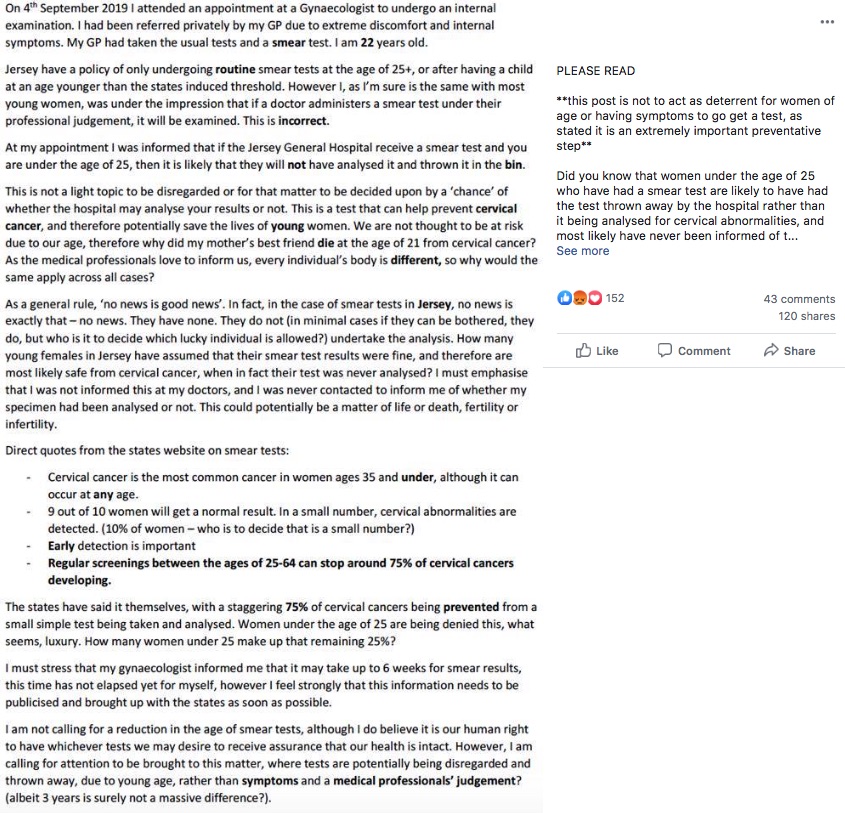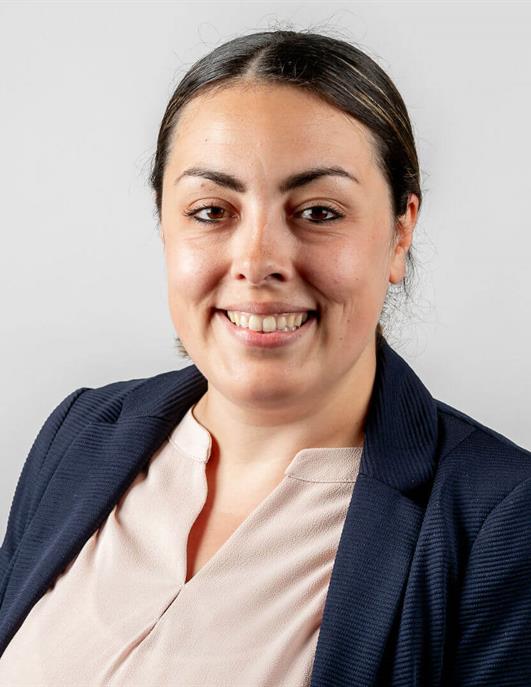


A panel of politicians is to grill the Health Department on the process for handling smear tests after a 22-year-old woman experiencing uncomfortable symptoms claimed she was told hers would not be processed.
The young woman took to social media to express her concern upon learning that her smear test may not be analysed, as she falls outside of the recommended 25-64 age bracket.
“I, as I’m sure is the same with most young women, was under the impression that if a doctor administers a smear test under their professional judgment, it will be examined. This is incorrect,” she wrote on Facebook.
The 22-year-old said she was aware of the reasons behind the 25-64 age bracket for routine testing, but said she was concerned that those experiencing symptoms under that age may not have their samples analysed – particularly given that cervical cancer can occur at any age.

Pictured: The young woman's post on Facebook.
Her post generated significant attention, with Deputies Louise Doublet and Carina Alves pledging to investigate the matter further. Numerous women also came forward to dispute the claim, explaining that they had undergone tests when they were under 25 and had their results back.
But the hospital's Head of Preventative Programmes Dr Linda Diggle told Express it was true that under-25s’ smear tests would not be analysed.
She said this had always been the case, but did not account for the women under the age of 25 who had undergone testing and received results back in recent years.
Dr Diggle explained that the reason cervical screenings were only carried out on women over 25 was because tests taken under that age can sometimes show ‘abnormal’ cell changes that would otherwise disappear on their own. Intervention at too early a stage, she said, could pose a risk to a woman’s fertility.
For that reason, she said that all tests taken under the age of 25 are deemed “ineffective”, meaning that their results would not be analysed and passed back to the patient.
Dr Diggle emphasised: “We’re not trying to save money here, because if we were we would not have made cervical screening free to women last year. My job is to encourage more women to come for screening – but that’s only screening for women in which the test is effective.”
Pictured: The Government recently ran a cervical screening campaign.
Outlining the handling process, Dr Diggle said that all samples are sent to an NHS laboratory – something that has been done since 2012 – along with the date of birth of the patient.
“They need to know the age of the woman whose sample they’re looking at because that makes a difference depending on what they’re finding. What happens is if the sample got to NHS lab of a woman of the wrong age, they wouldn’t test it,” Dr Diggle explained.
“Our laboratory books all of the samples in. They take great care with them. They dispatch them as promptly as possible to the NHS lab. They make sure that, when the result comes back, that result is returned as quickly as possible to the GP, who can then tell the woman. If they get a sample of a woman under the correct age for screening, what they would do is telephone the GP or telephone me and I will contact the GP and explain that, because of her age, the sample is not appropriate; the testing is not effective for women under the age of 25. It’s not impossible that a test may be wrongly taken... [But] every NHS laboratory, they all follow the same expert guidance.”
This, she said, would still be the case even if an under-25 woman in question had the test taken after experiencing symptoms of cervical cancer, which can include bleeding after sex, unexplained pelvic pain and irregular periods.
A government spokesperson later confirmed that cervical screenings were not “appropriate” for women “of any age” with symptoms, and said they should instead see their GP “as soon as possible” in order that they can be referred to a “specialist at the hospital for further investigations.”

Pictured: Dr Diggle said that samples are not analysed in Jersey's hospital, but at an NHS lab, where they are not analysed if the patient is under 25.
However, the position put forward by Dr Diggle that no sample taken from an under-25 would be analysed, runs contrary to the understanding of Deputy Carina Alves.
Having spoken with GPs, she said that she was told “if you are under 25 and experience any discomfort or other symptoms your GP can perform a smear and it will be analysed.”
The Health Scrutiny Panellist told Express she was concerned that there may have been “misinterpretation” or a “lack of communication” from the Health Department about the appropriate circumstances for a smear test.
She said young women needed to know the difference between “wanting and needing” a test, and that there should be greater awareness of what symptoms to seek medical help for urgently.
Deputy Alves added that she was concerned that fears over whether they would be able to be tested or have their samples analysed may make younger women reluctant to seek help if they have concerns about their gynaecological health.

Pictured: Deputy Carina Alves has said the Health Scrutiny Panel will be following up on the matter at their next quarterly hearing.
“It’s very difficult when you’re a young woman and you’ve just lost your virginity, and you don’t know what is normal. There’s a piece of work there to do on awareness.
“There needs to be more information out there and guidance. You do run the risk that people will say, ‘I wont go to the doctor and say anything’ and that’s the last thing we want to happen… The professionals need to be a bit more proactive – instead of saying, ‘Oh no, you’re under 25’, they need to clarify that a bit more.”
Deputy Alves said she had since raised the issue with her colleagues on the Health Scrutiny Panel, a group of politicians tasked with holding the Health Department to account.
She said the group would be seeking to cut through the confusion on whether smear tests taken from younger women can be analysed in exceptional circumstances by asking for clarity from the Health Minister at the panel’s next quarterly hearing.
Comments
Comments on this story express the views of the commentator only, not Bailiwick Publishing. We are unable to guarantee the accuracy of any of those comments.